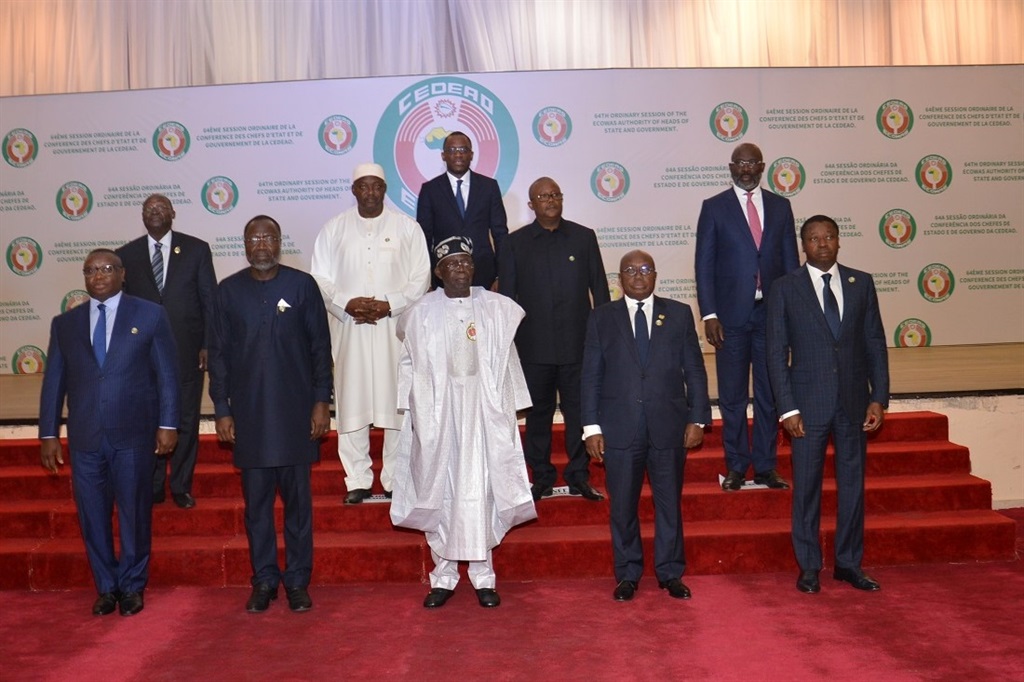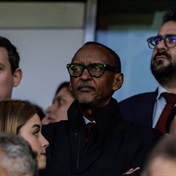
- Nigeria's president pleaded for constructive dialogue, prudent judgment, and collective work to find peace, security, and political stability in ECOWAS.
- ECOWAS on the weekend discussed the implications of the withdrawal of Mali, Burkina Faso, and Niger from the regional bloc.
- Those countries benefitted from foreign funding, including to their militaries, which are fighting widespread jihadism.
The withdrawal of three states from the Economic Community of West African States (ECOWAS) will do no favours for the bloc in its fight against terrorism while those countries literally pay the cost—not much shy of R2 billion.
ECOWAS held an extraordinary session in Abuja, chaired by Nigerian President Bola Tinubu, on the weekend.
Burkina Faso, Mali, and Niger all withdrew from ECOWAS as the region was shaken by coups. They are now all under military rule, and have formed a military pact called the Alliance of Sahel States (AES).
In his opening remarks, Tinubu said it was important for the heads of state from ECOWAS to "engage in constructive dialogue, exercise prudent judgment, and work collectively to find solutions to foster peace, security, and political stability in our region."
Critics have argued that AES was focused more on stoking anti-French sentiment than fighting violent extremism.
According to ECOWAS, the AES countries' "withdrawal will affect security cooperation in terms of sharing intelligence and participation in regional counter-terrorism initiatives, such as the Accra Initiative and Multinational Joint Task Force."
It was revealed during the meeting the three countries benefitted from a R1.9 billion fund known by its French name, Union Economique et Monétaire Ouest Africaine (UEMOA).
So far, the three have drawn up more than R142 million from the UEMOA fund to equip their armies.
"The authority recalled that within the framework of regional cooperation against terrorism, violent extremism, and organised crime, the three countries benefitted from US$100 million mobilised by UEMOA within the context of the ECOWAS Plan of Action against terrorism.
"Moreover, some Fund allocations (US$7.5 million) have been made towards supporting the three countries in acquiring equipment to help their fight against terrorism," reads the communique from the meeting.
Other countries entitled to the UEMOA are Benin, Côte D'Ivoire, Guinea-Bissau, Senegal, and Togo.
Available data indicates that in Burkina Faso since the two coups in 2022, militant Islamist groups have moved to encircle Ouagadougou, leaving a trail of unprecedented violence in their wake.
The data also indicated that last year, 87% of the violent events in the Sahel were concentrated in Burkina Faso and Mali.
After ordering out United Nations peacekeepers, Burkina Faso and Mali have strengthened their relations with the Africa Corps, the Russian group formerly known as the Wagner Group.
READ | Ghana's president urges Ecowas to cut the 'coup spirit' urgently
In January, via Telegram, a social media and messaging app, Africa Corps announced its arrival in Burkina Faso.
"A Russian contingent of 100 people will ensure the safety of the country's leader, Ibrahim Traoré, and the Burkinabe people from terrorist attacks.
"In the near future, the units will be replenished with another 200 military personnel from Russia," the statement said.
ECOWAS also highlighted the non-commital attitude of Niger to release, former President Mohamed Bazoum (corr) from military detention but they said they were committed "to maintaining dialogue with the government of Niger with a view to securing the release of President Bazoum and agreeing on a transition timetable."
Socio-Economic Implications
ECOWAS highlighted that the withdrawal of the three countries, which are already banned from the African Union (AU) could see themselves further isolated because they are disengaging from the international community.
"The withdrawal may also lead to diplomatic and political isolation at the international scene where the countries have obtained bloc support for their candidates and candidature in the contest for international positions within the African Union, the United Nations, and similar bodies," ECOWAS said in its communiqué.
Beyond the politics, citizens from these countries could find themselves burdened because "The withdrawal will automatically affect the immigration status of the citizens as they may be required to obtain a visa to travel around the region."
Their citizens could also find doing business in the region difficult because they could be subjected to different laws from those ECOWAS members abide by and "the three countries will cease to use ECOWAS passports, ECOWAS Biometric National Identity Card and the region-wide 'ECOWAS Brown Card' vehicle insurance."
ALSO READ | Ecowas secures 'temporary' asylum for treason-charged former Sierra Leone president Ernest Bai Koroma
The three states represent 17.4% of the region's 425 million population and 10% of the region's GDP, hence "their departure will constitute a reduction of the market size of ECOWAS."
For being part of ECOWAS they benefit from the Regional Food Security Reserve in which they control 52% of the regional stock.
Thus, they could greatly impact the region's food security which is one of the key drivers of instability.
They are part of the World Bank-funded Regional Support Program for Pastoralism in the Sahel region, where they were allocated R4 billion.
The programme seeks to increase the resilience of pastoralists and agro-pastoralists.
The Authority of Heads of State and Government of the Economic Community of West African States (ECOWAS) has convened an Extraordinary Summit on the Political, Peace and Security situation in the Republic of Niger. The Summit will hold in Abuja, on Saturday, February 24, 2024. pic.twitter.com/LDTBZSooXr
— Ecowas - Cedeao (@ecowas_cedeao) February 23, 2024
Other agro-based initiatives for the regional where the three countries are members of and could lose out are the Sahel Regional Irrigation Support Program and Regional Food System Resilience Support Program.
The three countries are also major players in the West Africa Power Pool linking ECOWAS to a regional electricity grid for improved access to electricity.
ECOWAS Bank for Investment and Development (IBID) could be forced to close shop in the three countries where 22.5% of its portfolio is.
In the three countries, the bank has 130 employees drawn from ECOWAS and they could lose their jobs when the bank closes four of its operations in the three countries.
Resolutions
The regional bloc decided with immediate effect to remove a series of sanctions that it imposed on Niger soon after the coup.
Hence, land borders with neighbouring countries will be opened.
This also means that the no-fly zone on all commercial flights to and from Niger will be canceled.
Banks in the ECOWAS region can now transact with those in Niger after the removal of the suspension of transactions.
Nigerien asserts including those of commercial banks located in any ECOWAS country will also be unfrozen as much as travel bans on government officials and their immediate families.
In the case of Mali, ECOWAS resolved "to lift restrictions on the recruitment of citizens to professional positions within ECOWAS institutions."
Another coup country, Guinea-Bissau will also have financial and economic sanctions lifted.
ECOWAS also resolved to still invite the four countries to meetings related to regional security.
"The Authority instructs the President of the Commission to invite all four ECOWAS Member States in transition to technical and consultative meetings of ECOWAS as well as to all security-related meetings."
The News24 Africa Desk is supported by the Hanns Seidel Foundation. The stories produced through the Africa Desk and the opinions and statements that may be contained herein do not reflect those of the Hanns Seidel Foundation.




 Publications
Publications
 Partners
Partners
























